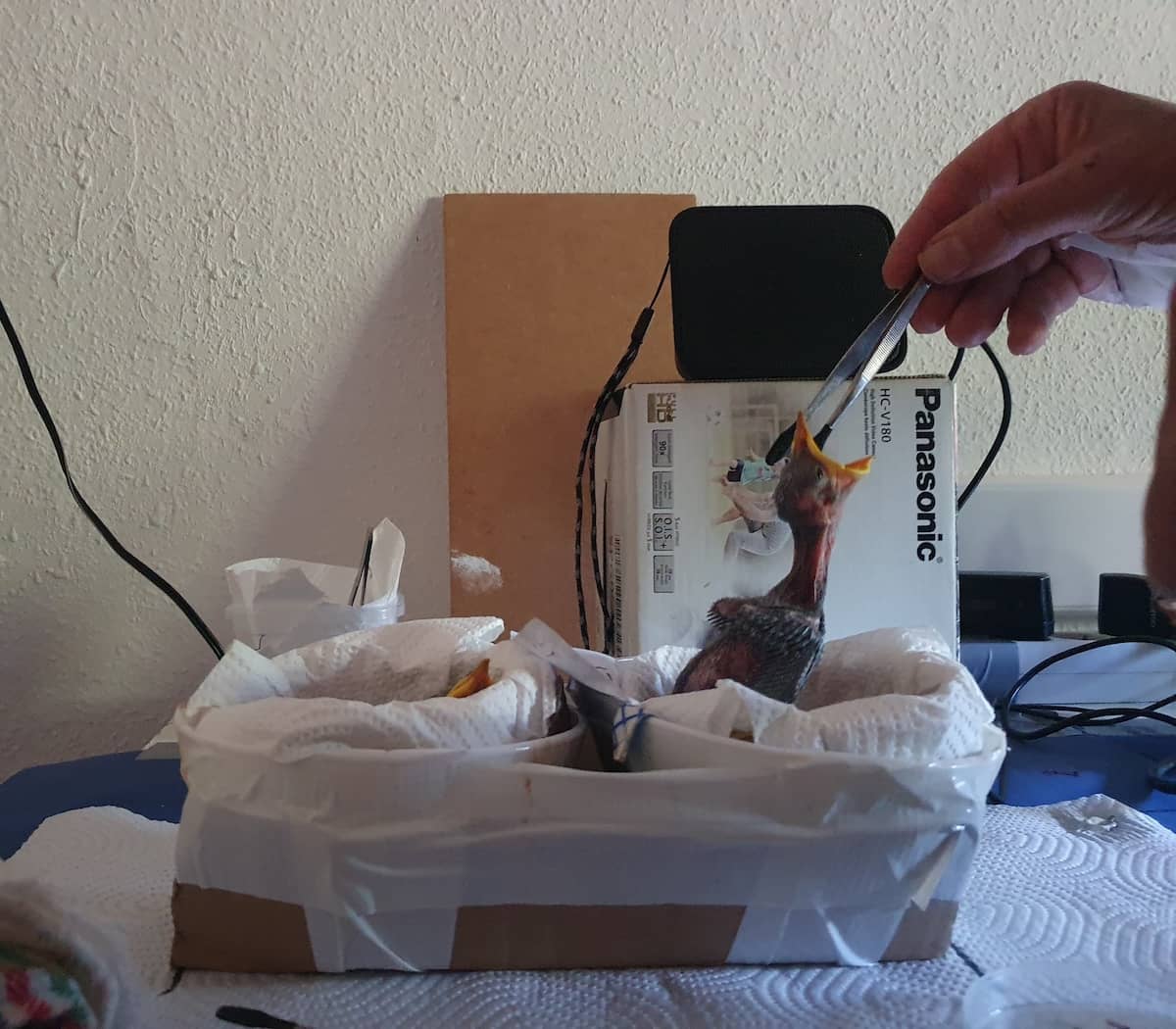Begging Comes at No Cost: higher food requests do not compromise nestling health

Detail of the experiment in which the begging behavior of both groups of chicks was manipulated. Experimental chicks (right) had to beg longer than control chicks (left) before receiving food. Photo: Daniel Parejo Pulido.
One of the great mysteries in the study of animal communication is understanding how the honesty of signals is maintained, preventing individuals from deceiving their receivers. For decades, the most widely accepted explanation has been the "costly signaling hypothesis" or "handicap hypothesis." According to this theory, for a signal to be reliable, it must come at a cost to the sender, so pretending to be in better condition than reality would be detrimental to survival.
A classic example of this type of communication is seen in the young of many bird species. Chicks insistently call their parents for food through vocalizations and conspicuous postures. The theory suggests that this behavior is an honest signal of their nutritional need and that it carries a physiological cost, preventing false signals from being sustainable. However, until now, empirical evidence to support this cost has been inconsistent.
Muchos estudios han intentado comprobar si la petición de alimento afecta la salud de los polluelos, manipulando experimentalmente la intensidad de sus llamadas en dos grupos: uno con mayor esfuerzo y otro control. Algunos resultados han sugerido que este comportamiento compromete el crecimiento, la inmunidad o el equilibrio energético de los pollos. Sin embargo, otros estudios han obtenido resultados contradictorios y han presentado limitaciones metodológicas, como diferencias en el nivel de estimulación entre grupos o el uso de pocos marcadores fisiológicos, lo que impide una visión completa del impacto real de la petición.
Many studies have attempted to determine whether begging for food affects chick health by experimentally manipulating the intensity of their calls in two groups: one exerting greater effort and a control group. Some results have suggested that this behavior compromises growth, immunity, or energy balance. However, other studies have yielded contradictory results and presented methodological limitations, such as differences in stimulation levels between groups or the use of a limited number of physiological markers, preventing a complete assessment of the true impact of begging.
To address these questions, a team of scientists from the Instituto de Investigación en Recursos Cinegéticos (IREC – CSIC, UCLM, JCCM) and the Estación Biológica de Doñana (EBD-CSIC) conducted an experiment with spotless starling (Sturnus unicolor) chicks. In this study, the intensity or effort of begging was manipulated in two groups of chicks: one had to exert more effort to receive food, while the other had a lower level of begging. Unlike previous studies, the researchers ensured that both groups experienced similar levels of stimulation and stress and analyzed up to 12 markers of health, growth, immunity, and oxidative stress, providing a thorough and reliable analysis.
The results were revealing: chicks that begged more intensely showed no significant differences in any physiological markers compared to those in the control group. In other words, increased begging effort did not negatively affect their health. This finding is robust, as multiple potential sources of error were controlled, various statistical approaches were used, and several physiological indicators were analyzed to avoid bias.
This study challenges central ideas in theoretical models about the evolution of parent-offspring communication in birds and suggests that if begging costs exist, they must meet very specific conditions. Furthermore, it raises the possibility that other alternatives, such as costs dependent on the individual's condition, costs associated with harm to other family members due to exaggerated begging, predation risk, or the existence of inexpensive and less informative signals, may also play a role in the evolution of these signals.
Ultimately, this work not only expands our understanding of avian communication but also questions the applicability of the "costly signaling hypothesis" in other animal communication systems. A new door opens to continue exploring the mysteries of communication in nature.
Reference
Parejo-Pulido, D., Casquero, S., Redondo, T., Pérez-Rodríguez, L. 2025. Escalated begging does not compromise nestling health. Behavioral Ecology 36, araf003.